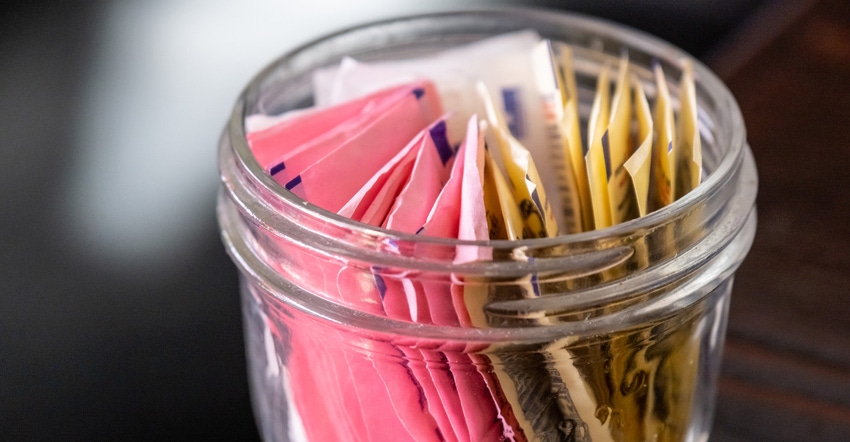
The Sugar Association has filed a petition asking the U.S. Food and Drug Administration to require “complete and accurate labeling” of low- and no-calorie sweeteners on food packages.
Action is needed to “improve label transparency, end misleading practices and help consumers make more informed decisions,” says Courtney Gaine, president and CEO of the Sugar Association, which represents U.S. sugarbeet and cane sugar growers, processors and refiners.
Misleading labels
Current food labels are misleading because they don’t identify non-nutritive sweeteners clearly in ingredient lists, she says. The chemical or products names such as aspartame, saccharin, acesulfame potassium, heotame, sucralose, steviol glycosides, Lou Han Guo and others are used instead.
In study of approximately 1,000 people for the Sugar Association, participants could only identify non-nutritive sweeteners in a list of ingredients 37% of the time, Gaines says.
But 73% of parents think it was important to know the amount of sugar substitutes in their children’s food, and 66% of consumers say it’s important for sugar substitutes to be clearly identified as sweeteners on food labels, according to Sugar Association research.
What sugar wants
The Sugar Association’s petition asks FDA to require food manufacturers to:
Add the term “Sweetener” in parentheses after the name of all non-nutritive sweeteners on the ingredient list.
Indicate the type and quantity of non-nutritive sweeteners, in milligrams per serving, in children’s food products.
Add the disclosure statement, “Sweetened with [name of Sweetener(s)],” beneath no-, low- and reduced-sugar content claims on food packaging.
Disclose the potential gastrointestinal side effects from the consumption of sugar alcohols and some sugar substitutes in foods at the lowest observed effect levels.
Ensure all sugar content claims related to sugar and sugar substitutes are truthful and not misleading.
The petition also asks FDA to use its enforcement discretion to require the disclosure “Not lower in calories” for the use of “No/Reduced Added Sugar” claims on the labels of foods when the product does not have 25% fewer calories than the food product to which it is compared.
Seventy percent of consumers believe that products labeled “Reduced Sugar” contain fewer calories than the original product, Gaines says. Too often, total calories are higher or the same in no-sugar or reduced-sugar products. Label claims mislead consumers into believing they are a healthier choice.
Close the gap
“These changes are necessary to close a gap in food labeling, but most importantly, they are necessary to provide consumers with complete transparency and accurate information about the contents of the products they buy and eat,” Gaine says.
The Calorie Control Council — a trade group representing manufacturers of artificial sweeteners — says it is reviewing the Sugar Association’s petition.
“Like other ingredients, low- and no-calorie sweeteners are required to be included on the ingredient list of product labels of all foods and beverages, allowing consumers to determine whether a product contains a particular sweetener,” the council said is a statement. “The American Academy of Pediatrics and the American Heart Association, alongside countless other health authorities, have warned against health risks of excess consumption of added sugars including childhood and adolescent obesity, dental decay, cardiovascular disease, hypertension, dyslipidemia, insulin resistance, type-2 diabetes mellitus, fatty liver disease and all-cause mortality.
“Low- and no- calorie sweeteners are a safe and effective alternative to added sugars.”
About the Author(s)
You May Also Like






